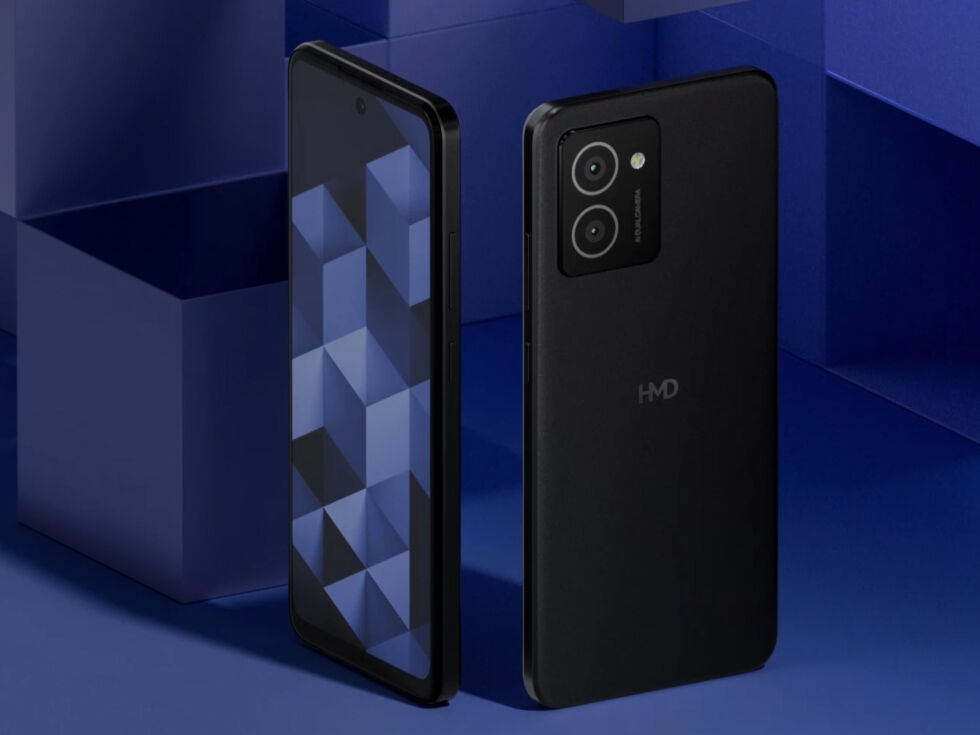HMD’s first self-branded phones are all under $200
-
The HMD Pulse base model.
-
The “Plus” version doesn’t have any discernible differences.
-
The Pro model has … bigger bezels?
HMD has been known as the manufacturer of Nokia-branded phones for years now, but now the company wants to start selling phones under its own brand. The first is the “HMD Pulse” line, a series of three low-end phones that are headed for Europe. The US is getting an HMD-branded phone, too—the HMD Vibe—but that won’t be out until May.
Europe’s getting the 140-euro HMD Pulse, 160-euro Pulse+, and the 180-euro Pulse Pro. If you can’t tell from the prices, these are destined for Europe for now, but if you convert them to USD, that’s about $150, $170, and $190, respectively. With only $20 between tiers, there isn’t a huge difference from one model to the next. They all have bottom-of-the-barrel Unisoc T606 SoCs. That’s a 12 nm chip with two Cortex A75 Arm cores, two A55 cores, an ARM Mali-G57 MP1, and it’s 4G only. Previously, HMD used this chip in the 2023 HMD Nokia G22. They also all have 90 Hz, 6.65-inch, 1612×720 LCDs, 128GB of storage, and 5,000 mAh batteries.
As for the differences, the base model has 4GB of RAM, a 13 MP main rear camera, an 8 MP front camera, and 10 W wired charging. The Plus model upgrades to a 50 MP main camera, while the Pro model has 6GB of RAM, a 50 MP main camera, 50 MP front camera, and 20 W wired charging. There is a second lens camera on the back, but it appears to be only a 2 MP “depth sensor” on all models.
Oddly, the Pro design is slightly worse than the cheaper phones, with thicker bezels and a bottom chin. Other than that, the phones have near-identical designs, and they all look good for a phone at this price. The Pulse phones, and only the Pulse phones, apparently, are marketed as “built to be repairable” and will have parts that will be available at iFixit. It’s hard to say exactly what “repairable” means since none of that information is out yet, but HMD’s last “repairable” phone didn’t contain any repair-focused innovations. It just seemed like a normal, non-waterproof cheap phone with a new marketing angle.

The US is getting the closely related “HMD Vibe,” which sounds like a more capable device with a Snapdragon 680. It’s old as far as Qualcomm chips go (from 2021), but it’s not a Unisoc. This is a 6 nm chip with four Cortex A73 cores and four Cortex A53 cores. It has 6GB of RAM, the same screen as the other devices, and only a 4,000 mAh battery for $150. The camera sounds like a low-end loadout, with only a 13 MP main shooter and a 5 MP front. All the phones have NFC, a 3.5 mm headphone jack, a Micro SD slot, USB-C ports, and they come with Android 14 and two OS upgrades. The European phones all have side fingerprint readers, and the real deal-breaker for the US seems to be that it doesn’t have a fingerprint reader at all.
HMD’s desire to step away from the Nokia brand is an odd one. Lots of historic phone companies that washed out of the phone market have licensed their brand to a third party, giving rise to the “zombie brand” trend. Blackberry, Palm, and Motorola all come to mind. HMD was different, though; at launch, it was more of a spiritual successor to Nokia rather than a random manufacturer licensing the brand. Both companies are Finnish, and HMD’s headquarters are right across the street from Nokia. The company’s leadership is filled with former Nokia executives. Nokia even owns 10 percent of HMD, while FIH Mobile, a division of Chinese manufacturing juggernaut Foxconn, owns 14 percent.
Despite all that, HMD is stepping out of the shadow of Nokia and trying to start its own brand. The company plans to go with a “multi-brand” strategy now, so Nokia phones will stick around, but expect to see more HMD-branded phones in the future. The company is also open to other brand partnerships. It just released a bizarre “Heineken” dumbphone in partnership with the beer brand and is planning a “Barbie flip phone” with Mattel this summer.
Listing image by HMD
https://arstechnica.com/?p=2019993